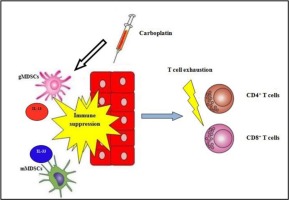当前位置:
X-MOL 学术
›
Mol. Immunol.
›
论文详情
Our official English website, www.x-mol.net, welcomes your
feedback! (Note: you will need to create a separate account there.)
Carboplatin chemoresistance is associated with CD11b+/Ly6C+ myeloid release and upregulation of TIGIT and LAG3/CD160 exhausted T cells.
Molecular Immunology ( IF 3.2 ) Pub Date : 2019-12-17 , DOI: 10.1016/j.molimm.2019.11.008 Doxakis Anestakis 1 , Savvas Petanidis 2 , Kalliopi Domvri 3 , Drosos Tsavlis 4 , Paul Zarogoulidis 5 , Theodora Katopodi 6
Molecular Immunology ( IF 3.2 ) Pub Date : 2019-12-17 , DOI: 10.1016/j.molimm.2019.11.008 Doxakis Anestakis 1 , Savvas Petanidis 2 , Kalliopi Domvri 3 , Drosos Tsavlis 4 , Paul Zarogoulidis 5 , Theodora Katopodi 6
Affiliation

|
Immunosuppressive chemoresistance is a major barrier in lung cancer treatment. Tumor immunosuppressive environments mediated by myeloid-derived suppressor cells (MDSCs) play a key role in chemotherapy induced MDSC development and differentiation but their mechanistic role has not been elucidated. Here, we define a role for carboplatin based chemotherapy in potentiating an MDSC-dependent pathway that triggers the chemoresistance mechanism. Findings reveal MDSC differentiation and activation of IL-13/IL-33-mediated pathway through VCAM/RANTES following carboplatin treatment. Furthemore, secretion of T regulatory IL-10-producing CD4+Foxp3+ cells was increased followed by expression of co-inhibitory receptor TIGIT on T cells, leading to a dysfunctional T cell phenotype. These cells were characterized by an immunosuppressive phenotype with impaired activation, proliferation and cytokine production. Lung cancer tissues expressed CD155, which bound TIGIT receptors and inactivated CD8 T cells. This TIGIT expression on tumor-infiltrating T cells was found to be associated with tumor progression and was linked to functional exhaustion of T cells. In addition, the presence of plasmacytoid dendritic cells (pDCs) exposed to tumor-derived factors further enhanced tumor progression through IL-10 production and up-regulation of the inducible co-stimulatory ligand (ICOS-L). Deciphering these deranged immune mechanisms and how they are impacted by chemotherapy induction is essential for incorporation of novel immune-based strategies in order to restore immunity and inhibit the immunosuppressive phenotype of metastatic lung cancer.
中文翻译:

卡铂的化学抗性与CD11b + / Ly6C +髓样释放以及TIGIT和LAG3 / CD160耗尽的T细胞的上调相关。
免疫抑制化学耐药性是肺癌治疗中的主要障碍。髓样来源的抑制细胞(MDSCs)介导的肿瘤免疫抑制环境在化疗诱导的MDSC发育和分化中起关键作用,但其机理作用尚未阐明。在这里,我们定义了基于卡铂的化疗在增强触发化学耐药机制的MDSC依赖性途径中的作用。研究结果揭示了卡铂治疗后MDSC的分化和通过VCAM / RANTES激活IL-13 / IL-33介导的途径。此外,增加产生T调节性IL-10的CD4 + Foxp3 +细胞的分泌,然后在T细胞上表达共抑制受体TIGIT,导致功能性T细胞表型失调。这些细胞的特征在于具有抑制激活,增殖和细胞因子产生的免疫抑制表型。肺癌组织表达CD155,该CD155结合TIGIT受体并使CD8 T细胞失活。发现在浸润肿瘤的T细胞上的这种TIGIT表达与肿瘤进展有关,并且与T细胞的功能衰竭有关。另外,暴露于肿瘤衍生因子的浆细胞样树突状细胞(pDC)的存在通过IL-10产生和诱导型共刺激配体(ICOS-L)的上调进一步增强了肿瘤进展。
更新日期:2019-12-27
中文翻译:

卡铂的化学抗性与CD11b + / Ly6C +髓样释放以及TIGIT和LAG3 / CD160耗尽的T细胞的上调相关。
免疫抑制化学耐药性是肺癌治疗中的主要障碍。髓样来源的抑制细胞(MDSCs)介导的肿瘤免疫抑制环境在化疗诱导的MDSC发育和分化中起关键作用,但其机理作用尚未阐明。在这里,我们定义了基于卡铂的化疗在增强触发化学耐药机制的MDSC依赖性途径中的作用。研究结果揭示了卡铂治疗后MDSC的分化和通过VCAM / RANTES激活IL-13 / IL-33介导的途径。此外,增加产生T调节性IL-10的CD4 + Foxp3 +细胞的分泌,然后在T细胞上表达共抑制受体TIGIT,导致功能性T细胞表型失调。这些细胞的特征在于具有抑制激活,增殖和细胞因子产生的免疫抑制表型。肺癌组织表达CD155,该CD155结合TIGIT受体并使CD8 T细胞失活。发现在浸润肿瘤的T细胞上的这种TIGIT表达与肿瘤进展有关,并且与T细胞的功能衰竭有关。另外,暴露于肿瘤衍生因子的浆细胞样树突状细胞(pDC)的存在通过IL-10产生和诱导型共刺激配体(ICOS-L)的上调进一步增强了肿瘤进展。































 京公网安备 11010802027423号
京公网安备 11010802027423号